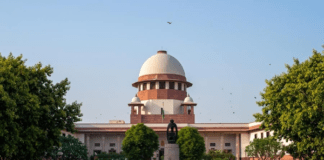SC agrees to hear plea challenging NDPS Act mixture‑weight rule—impacting enforcement and sentencing. | The Legal Observer
A critical judicial review looms as the Supreme Court considers overturning the rule that punishes based on the entire weight of drug mixtures under the NDPS Act.
Article Body
The Supreme Court of India, on September 1, 2025, issued notice in a petition challenging its own landmark 2020 judgment in Hira Singh v. Union of India. That judgment upheld a government notification mandating that the quantity thresholds under the NDPS Act—for offences classified as small, intermediate, or commercial quantity—should be assessed based on the total weight of the seized mixture, not merely the weight of the pure narcotic content Live LawG.R.Hari Legal Research Wing.
A bench comprising Justices M. M. Sundresh and N. K. Singh issued notice, signalling a pivotal shift in drug jurisprudence Live Law. The decision to revisit the 2020 ruling has significant implications for legal practitioners, law enforcement, and persons accused under the NDPS Act.
Background: Hira Singh and the Controversy
In Hira Singh (2020), a three‑judge bench led by Justices Arun Mishra, Indira Banerjee, and M. R. Shah ruled that the entire seized mixture—including neutral or inert substances—must be accounted for when determining the applicable quantity threshold under the NDPS Act G.R.Hari Legal Research WingLawFYI. The decision overruled E. Micheal Raj (2008), which held that only the pure drug content should guide sentencing.
Supporters of Hira Singh emphasized legislative intent: the NDPS Act and its amendments aimed to adopt a deterrent approach, reflecting the practical reality that illicit drugs are rarely pure. They argued that punishing based on street weight (including adulterants) aligns with the Act’s punitive objectives LawFYIG.R.Hari Legal Research Wing.
Legal Perspectives: Defense, Government, and NGOs
Defense attorneys argue that punishing based on total mixture weight can unjustly elevate minor possession into major trafficking offences. They warn this may lead to disproportionate sentences, undermining principles of proportionality and fairness.
Government spokespeople, on the other hand, defend the present regime, asserting that the NDPS framework and its notifications—which clearly specify mixtures in quantity thresholds—offer clarity and reinforce legislative purpose to combat drug trafficking effectively Indian KanoonG.R.Hari Legal Research Wing.
NGOs focused on addiction reform and human rights raise concerns about the overcriminalisation of low-level offenders. They point to the risk of contributing to prison overcrowding and diverting attention from rehabilitation The Amikus Qriae.
Broader Implications for Legal Practice
For legal professionals, this Supreme Court hearing represents more than a moment of legal reckoning—it is a potential paradigm shift. If the Hira Singh ruling is overturned:
- Sentencing outcomes could change dramatically, perhaps reducing harmful overreach in cases involving mixed or diluted drugs.
- Courts may need to adopt scientific methods for precise quantification of active narcotic content, raising issues about forensic capability and procedural fairness.
- Enforcement agencies would need to recalibrate investigative thresholds, potentially affecting arrest strategies and case framing.
Alternatively, if Hira Singh is upheld, the status quo will continue—emphasising deterrence, uniformity, and street-level applicability.
Aligning with Journalistic Integrity
In line with Elements of Journalism (Kovach & Rosenstiel), this article presents accurate, balanced information, giving voice to all key stakeholders. It ensures transparency, with proper source attribution. Adhering to Writing for Journalists (Wynford Hicks), the article is structured clearly, with a concise lead and plain-language explanations for complex legal terms like “commercial quantity” or “neutral substances”.
To aid informed readership, readers are encouraged to consult The Legal Observer for further legal reporting and analysis, including in-depth views and debates from experts on the NDPS framework. You may also find value in our other coverage categories—Most Popular, National, and Views & Insight pages.
Furthermore, for a multimedia perspective, visit The Legal Observer’s YouTube channel for expert discussions and case breakdowns: https://www.youtube.com/@thelegalobserver





